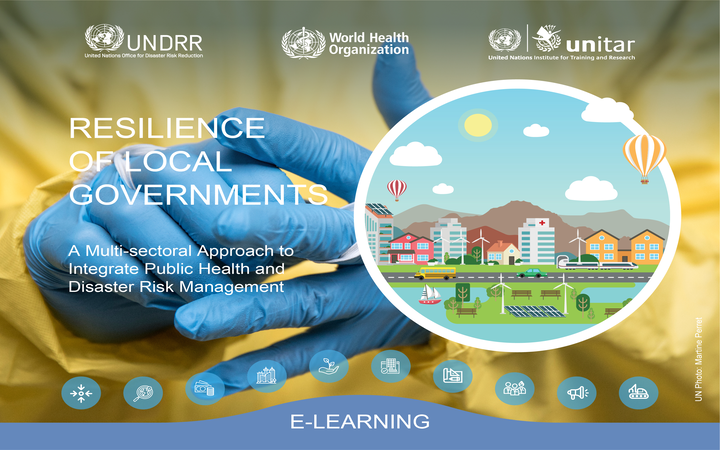8 June 2020, Geneva, Switzerland - All communities are at risk of emergencies and disasters, including those associated with natural hazards, infectious disease outbreaks, conflicts, technological and other hazards. Particularly in the context of increased urbanization and climate change, frequency, severity and impact of those events are crucial. The health, economic, political and societal consequences of these hazards can be devastating for developed and developing countries.
Currently, countries face the COVID-19 pandemic with millions of cases and thousands of deaths confirmed worldwide, demonstrating the profound impact that pandemics have for public health systems and for other systems within the city/country. The COVID-19 pandemic reiterates the need for comprehensive resilience and risk reduction plans that involves all sectors and actors in society.
The e-Learning Course “Resilience of Local Governments: A Multi-sectoral Approach to Integrate Public Health and Disaster Risk Management offered by the United Nations Office for Disaster Risk Reduction (UNDRR) and its Global Education and Training Institute (GETI), the World Health Organization (WHO) and the United Nations Institute for Training and Research (UNITAR) aims to contribute to strengthening the capacity of local government officials for risk reduction and resilience planning inclusive of health threats management.
In view of current and emerging risks to public health and the need for more effective coordination and management of resources, this e-learning course developed by UNITAR’s Division for People presents two frameworks that provide guidance on how to integrate public health systems and disaster risk management:
- UNDRR’s Disaster Resilience Scorecard for Cities: Public Health System Resilience, which provides a tool to strengthen local governments resilience by ensuring that public health issues are taken into consideration when planning for disaster risk reduction/resilience.
- WHO’s Health Emergency and Disaster Risk Management Framework (Health EDRM), which offers a comprehensive approach that can be applied by all actors in health and other sectors who are working to reduce health risks and consequences of emergencies and disasters, and build the resilience of health systems, communities and countries.
In the upcoming months, UNITAR jointly with the UNDRR Office for Northeast Asia (ONEA) and the Global Education and Training Institute (GETI) will continue to collaborate to offer online training on “Understanding the Sendai Framework in coherence with the SDGs –Towards the Implementation of the National Disaster Risk Reduction Strategy”.


